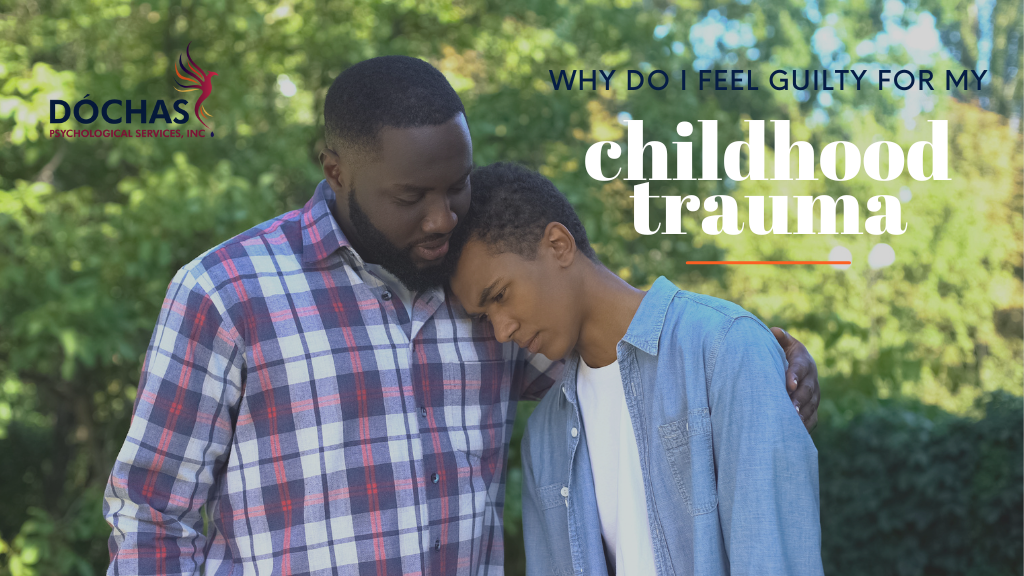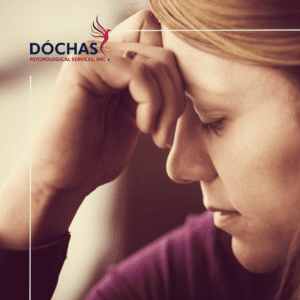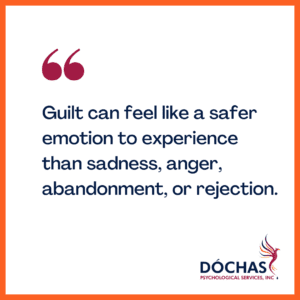Guilt and shame are common emotions experienced by people who have endured childhood trauma. But why? Why feel guilty for childhood trauma, something that was out of your control? It’s Justine on the blog today, and I’m going to dig in to the guilt and shame that can surround traumatic experiences like this—and offer some tips for overcoming it.
Guilt Vs. Shame
What is this feeling called guilt, and is it the same or different than shame? Well, guilt and shame are two different but common emotions experienced by those who have experienced childhood trauma. “Guilt is a feeling you get when you did something wrong or perceive you did something wrong. Shame is a feeling that your whole self is wrong, and it may not be related to a specific behavior or event.” (Saulters-Pedneault, 2021)
A common experience of guilt felt by survivors of childhood trauma is often altruistic guilt, which results from a strong inclination to protect others (most often caregivers and even those who inflicted the abuse). And sometimes, guilt can feel like a safer emotion to experience than sadness, anger, abandonment, or rejection, for example, while at the same time, guilt can be comforting. Guilt can be one emotion that gives you a feeling of control, unlike anger or fear. (see Jill Alexander’s post at The Mighty about this). It’s no wonder people who’ve experienced childhood trauma often feel a lot of guilt.
Shame, on the other hand, often stems from not feeling seen or loved within the family and concluding it was because there was something wrong with you. “How we’re treated by others when we were children becomes the way we internally treat ourselves. The experiences which we were shamed as children become the unconscious triggers for feeling and expressing shame as adults” (Overcoming Shame and Restore Your Self Esteem)
While guilt and shame may have provided comfort or aided in your survival at some point, it is a very difficult emotion to shift and can result in causing you to feel trapped rather than comforted.
How to overcome childhood trauma
Processing and overcoming childhood trauma isn’t a quick fix, but there are strategies to help you navigate this. Here are some places to start.
Recognize your emotions and their function
Ask yourself if this emotion is benefiting or harming you at this time in your life. Chances are that your guilt really isn’t doing much to protect you, and it may even be hurting your well-being and relationships. It’s important to also take notice of how guilt may be felt physically. For example, does it feel “heavy”? does it feel like nausea? Our body is deeply intertwined with our emotion system and drawing attention to our physical experience can provide us with plenty of insight and awareness into our emotions.
Find a supportive space to talk about your guilt
As Dr. Dan Siegel says, “name it to tame it”. Describing or labelling our internal state without needing to explain our feelings helps us to connect our emotions with other parts of our brain, helping us calm down and feel more balanced. (He goes into more detail on how this works here).
Recognize triggers that result in feelings of guilt
For example, do you notice that you feel guilty after saying no to someone’s request? Once you identify triggers to your guilt you can begin to develop new perspectives and healthier ways of thinking and responding to these triggers.
Challenge negative self talk that comes from guilt
Remember, our thoughts are influenced by the way we feel, which influences the way we behave and react to situations. This becomes a repetitive cycle if we are unaware of it. As well, feelings are feelings and thoughts are thoughts—neither of them are facts.
Nurture your own emotional and psychological needs
Nurturing your own emotional and psychological needs helps to rescript the belief that often results in feelings of shame and guilt. For example, your inner self (sometimes referred to as your inner child) will begin to get the message that they are loved, seen, important, and they will begin to feel validated and worthy as a result of their needs being met. While this can be a very long and difficult process in itself, it can slowly begin to change the internal dialogue that often leads to feelings of guilt and shame.
Seek professional help
Often this journey involves seeking professional help, and that’s okay! A therapist can be helpful in guiding you through your feelings of shame and guilt, and teaching you ways to cope. Here at Dóchas, we love to be a helping hand for those who need a little professional help in navigating their experience, so reach out to us with any questions you might have. You can contact the clinic by emailing info@dochaspsych.com or calling us at 780 446 0300.
About Dóchas Psychological
Dóchas Psychological Services is a well-established and trusted therapy clinic located in Spruce Grove, Alberta. At Dóchas we value the idea that everyone deserves a safe space. Through connection and education, our team works hard to build a trustworthy relationship with each of our clients. It is our goal to create a community for our clients to feel like they belong.
Disclaimer
Information provided through Dóchas Psychological Services blogs or vlogs is meant for educational purposes only. They are NOT medical or mental health advice. You can read more about our disclaimer here.



